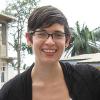Mothers’ Union Organizes to Boost Adult Literacy

“Literacy is a key lever of change and a practical tool of empowerment on each of the three main pillars of sustainable development: economic development, social development and environmental protection.”
– Former UN Secretary-General, Kofi Annan
In honor of International Day of Literacy we look at a literacy program that reaches the most remote areas in the Solomon Islands.
————————————
Three women sit together on one side of the meeting hall in Tausese, in the Diocese of Ysabel, Solomon Islands. A sturdy building with a wooden roof, the town’s community center is open to the sea breezes and welcoming with woven coconut-fiber mats and benches for seating.
At the front of the hall, Emily Pengalo and Rachel Leka – the Provincial Literacy Field Officer and the Diocesan Literacy Coordinator, respectively – refer to the program’s training manual, “How to Start a Literacy School.” Seated on the benches, thirteen local teachers, all women, have assembled for advanced training on adult education techniques, lesson planning and community organizing.

The other three women, Emily says, cannot read, but wanted to sit in and listen to the training sessions so they can hear what the teachers are learning. Far from being unwelcome, they offer the trainees an opportunity to practice their techniques, and also learn some basics in the process.
One of the women, Judy, in a yellow shirt, reflects on how adding reading and writing to her abundant skill set could open a whole new way of interacting with the world, and enable her to live more fully:
“As I grew up, I learned many things by imitating and doing things physically,” she says. “I can cook well, I grow food in the garden, I beautify the surrounding of my house with flowers and plants. … [But] this literacy training you are introducing has opened the door [from the] darkness I have been in all this time, and I am happy that I am allowed to sit in during the sessions throughout the week, to see it and experience it.”

Teaching literacy for adults requires a very different approach than teaching children, and although there were local initiatives and schools in some places, until recently no one had tackled the issue in a comprehensive way. The spread-out geography of the Solomon Islands, combined with transportation challenges and unpredictable weather, make it a daunting task. But the Anglican Church of Melanesia has a widespread network of congregations and a large membership (200,000 of the area’s 800,000 residents), which means its capacity for grassroots action is unparalleled in the region.
Working in partnership with Episcopal Relief & Development, the Church of Melanesia has created a group of integrated development programs that empower communities to fight poverty, hunger and disease. The Church is working through the Mothers’ Union in the Solomon Islands and Vanuatu to promote health education and literacy, and with other local partners to refine its innovative agricultural programs and expand vocational training opportunities.

In order to ensure sustainability and long-term impact, all of the Church’s programs rely on local leadership and resources. For the literacy program, this means making classrooms out of community halls, front porches or living rooms. Teachers often have previous experience, but ongoing training gives them the most up-to-date tools and a community of support to stay motivated. Some of the teachers are even former students, who are seeking to share the skills they have learned, and thereby lift up their entire community. Furthermore, having this organized structure of teachers and trainers in place enables other information such as preventive health education to be shared widely, helping to improve quality of life overall.
One particular strength of the Church is its widespread presence, which enables programs and staff to reach remote areas where it would be challenging for other agencies to go. Indeed, the importance of outreach and meeting people where they are is hard to overstate! As seen with Episcopal Relief & Development’s NetsforLife® program, not only is the impact of the program greater when resources and expertise are brought to communities and households, but the impact is longer-lasting because communities see that they are cared about, and relationships are able to grow over time.

At the opening reception in Tausese, when Emily and Rachel arrived, the community chief addressed the crowd with a message of esteem and appreciation:
‘We are very grateful that one of you trainers is from the [Provincial Mothers’ Union] office, [that you] came all the way down to the village, giving a chance to our women to be trained as adult literacy teachers whom we feel very proud of. Literacy is seen as one of our priority needs in the community. All other trainings were always held in the Diocesan center where our village women couldn’t make it. I stand here to express our thankfulness and appreciation seeing the training team is here in this village.”

In 2014, the literacy program is reaching all seven dioceses in the Solomon Islands, with support for 65 literacy schools, including 19 new this year. With a total of 118 teachers and more than 800 students – of whom 85% are women – the program is reaching more than 4,000 people, since the literacy students will bring home what they have learned and either help children with homework or share with other adults in their households.
“The Church of Melanesia and the Mothers’ Union in the Solomon Islands have done a tremendous job mobilizing their communities around adult literacy,” said Tammi Mott, Program Officer for Episcopal Relief & Development. “As a key implementing organization with a trusted reputation and years of on-the-ground experience, not only have they achieved great results so far, but they are also able to participate in the creation of national policy and guidelines alongside the official government ministry and national literacy association. It is a success that the Church is able to have a place as a national stakeholder, not only out of respect, but as a proven partner.”
—————————–
Faith Rowold is Communications Officer for Episcopal Relief & Development
Images: Book Art by artist Isaac Salazar
————————————
Healing the world starts with your story!
During the 75th Anniversary Celebration, we are sharing 75 stories over 75 weeks – illustrating how lives are transformed through the shared abundance of our partners and friends like you! We invite you to join us in inspiring/energizing our vibrant community by sharing your own story!




